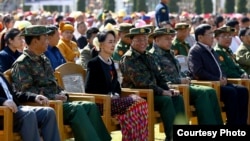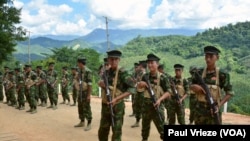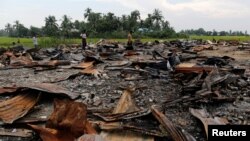Myanmar’s government is meeting with an alliance of ethnic rebel groups this week to try to revive a peace process that has stalled after months of increased fighting in the country’s north.
The violence has evaporated early optimism about Aung San Suu Kyi’s ability to control the army and promote peace. The instability near China’s southern border has prompted it to become directly involved in the peace process.
The government and rebels are cautiously welcoming China’s support, but some analysts question whether Beijing is trying to influence the process through its links with powerful rebel groups.
Resuming talks
On Wednesday, de facto government leader Aung San Suu Kyi held the first high-level meeting since mid-October with the seven-member United Nationalities Federal Council (UNFC), including the Kachin Independence Army (KIA).
They discussed the rebels’ conditions for joining a delayed peace conference, signing of the Nationwide Ceasefire Agreement (NCA), and joining a political dialogue over the creation of a federal, democratic union.
Eight out of 21 rebel groups signed the NCA in 2015, gathering praise from Western governments who supported the process. The National League for Democracy (NLD) government wants to bring all groups on board.
“Our State Counsellor is opening the door for all (rebels) who are non-signatories to … sign the NCA and to participate in the political dialogue,” said government spokesperson Zaw Htay.
But restoring the necessary trust will not be easy. Rebel groups have been angered by the NLD’s silence over the recent offensives by the army, which controls the defense and home affairs ministries under the constitution.
China involvement
Since September, the military has launched heavy attacks, including countless airstrikes, on the KIA and ethnic Ta’ang, Kokang and Rakhine rebel groups in northern Myanmar.
The four groups formed the Northern Alliance-Burma in late November and launched retaliatory attacks on Muse, a Myanmar-China border crossing with some $4 billion in annual trade. Rebels held the border town of Mong Ko for weeks and hit roads and bridges. A key demand of the groups was Chinese mediation in the peace process.
The fighting caused thousands of civilians to flee into China and prompted Beijing to call for an immediate ceasefire. China had occasionally supported the peace process since conflict erupted in northern Myanmar in 2011, but now its state media is encouraging greater involvement and China has begun hosting multiple meetings.
Since late November, Myanmar and China have held two high-level meetings in which their foreign affairs ministries and defense ministries discussed border security. In December, the four rebel groups and Myanmar officials were invited to the Yunnan Province capital Kunming, but talks fell through soon after the participants arrived.
China has since offered $3 million for peace talks, and its diplomats are urging the government and all rebels to sign an inclusive nationwide ceasefire.
Last month, Karen National Union (KNU) Chairman Mutu Say Poe became the first Karen rebel leader to visit China. He met with Special Envoy for Asian Affairs Sun Guoxiang in Kunming before traveling to KIA headquarters on the border to discuss the stalled peace process. The KNU is a NCA signatory.
Beijing welcomed
Euro-Burma Office Director Harn Yawnghwe attended the meeting and told VOA, “Sun Guoxiang made it clear that China would not intervene in Myanmar. … It will not be a judge or an arbitrator. But it would like to see peace and stability in Myanmar.”
Under these conditions the NCA signatory groups would probably accept China’s involvement, he added.
UNFC secretary Khu Oo Reh said the alliance has had no contact with China and it remains to be seen what role Beijing can play. But he added, “As we (rebels and government) don’t really trust each other, we need international involvement.”
Htay, Aung San Suu Kyi’s spokesperson, stressed the NCA process was “grown locally” but said the Myanmar leader had asked for support during an August visit to Beijing as “China is the key player to encourage all non-signatory groups to come to the table.”
But the army remains distrustful of China’s continuing links with the United Wa State Army (UWSA) and the ethnic Chinese Kokang and Mong La rebels, who waged a China-backed communist insurgency until they reached ceasefires with the former junta in 1988. Observers believe the 20,000-strong UWSA obtained Chinese heavy weaponry in recent years and provides key support to other rebels.
Tom Kramer, a researcher with the Transnational Institute who studied the Wa, said the Myanmar army is reluctantly welcoming Chinese involvement because “maybe the army is now thinking that China can put pressure on the northern groups to join the NCA — that could be the calculation.”
Wa rebels reject NCA
Last week, however, the UWSA hosted six rebel groups, including the KIA, for a meeting on the peace process, and to the surprise of many observers, the Wa-led gathering rejected the NCA and called for a completely new peace process arbitrated by China.
Anthony Davis, a security analyst specializing in Myanmar, said China’s public support for the NCA represents only one side of its approach to the peace process. He argued the new demands by the increasingly assertive Wa rebels reveal a different Chinese plan altogether.
“It would be naïve to suppose that the Wa, who ultimately depend on Chinese support, are adopting a position that would fly in the face of Beijing’s long-term interests,” Davis told VOA. “There’s a good cop-bad cop routine being played out here and the endgame is not difficult to foresee: a new peace process in which Chinese rather than Western or Japanese mediation will be essential for success.”
Government spokesperson Zaw Htay said the UWSA-led demands “may complicate some issues” but would not derail the NCA process, adding that any differences with the Wa could be resolved through planned political dialogue.










